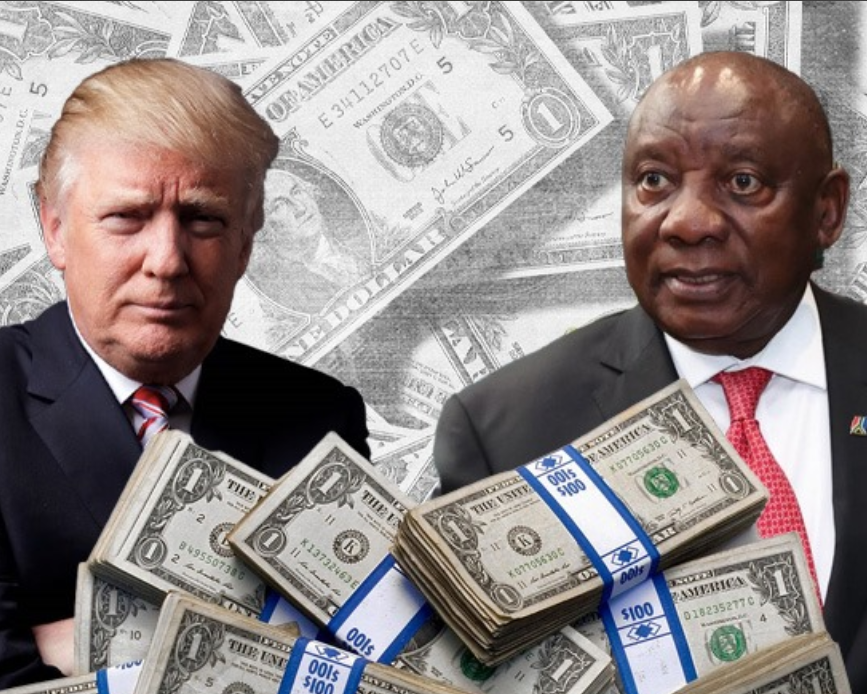Cape Town – United States President Donald Trump’s tariff war continues to threaten global trade and could deal a severe blow to key sectors in southern Africa — particularly South Africa and Lesotho — despite Washington’s recent 90-day pause on new levies.
International trade expert Dr Gustav Brink, speaking to Daily Investor, said the tariffs — based on flawed economic logic — risk crippling industries that rely on trade preferences such as those offered under the African Growth and Opportunity Act (AGOA). The preferential trade deal has enabled African countries to export selected goods duty-free to the US, but its future now hangs in the balance.
While Trump recently floated a universal 10% “reciprocal tariff” and announced a temporary suspension of additional hikes, analysts say this is cold comfort for developing nations.
Based on the lack of respect that China has shown to the World’s Markets, I am hereby raising the Tariff charged to China by the United States of America to 125%, effective immediately. At some point, hopefully in the near future, China will realize that the days of ripping off…
— Donald J. Trump Posts From His Truth Social (@TrumpDailyPosts) April 9, 2025
According to an AFP report, the 10% baseline tariff effectively nullifies AGOA’s benefits — particularly for South Africa’s car and citrus exports and Lesotho’s textiles.
“All this means is that Trump was looking for an easy way to fix the US’ trade deficit. The US has run a massive trade deficit for years, and it actually grew at its strongest rate under the previous Trump presidency.
“The formula, which simply looks at the difference between the value of goods exported by the US to a country and the value of imports into the US from that same country, divided by the value of US exports, is completely irrational,” Brink was quoted as saying.
The African auto industry stands to be among the hardest hit. South Africa currently exports 25,000 vehicles annually to the US, valued at R35 billion ($1.8 billion), according to the Automotive Business Council (Naamsa). About 125,000 jobs — including subcontractors — depend on this trade.
ALSO READ | ‘TOY SOLDIER & POLITICAL MOSQUITO!’ — Kunene slams Malema in wild Trump rant
“With the broader impact (of the tariffs) on the global industry, it’s unlikely South Africa could find an alternative market,” said Alex Vines, director of the Africa programme at Chatham House, speaking to AFP. “It would be devastating to South Africa, which already suffers from exceptionally high unemployment,” currently at 32%.
Brink also warned that as the US closes its doors to Chinese goods, China could redirect exports to African markets, increasing competition and threatening local manufacturers.
The looming loss of AGOA could be catastrophic for Lesotho, where the textile sector — a flagship AGOA success story — accounts for around 10% of gross national income and employs tens of thousands. Richard Morrow, an analyst at the Brenthurst Foundation, told AFP that up to 40,000 jobs could be at risk if AGOA is terminated.
“The clothes and textiles industry contribute as much as 10 percent of Lesotho’s gross national income,” Morrow said. “In those economies where you have a low- or semi-skilled workforce, which has been largely built around one or two particular industries, it could have a disastrous effect.”
ALSO READ | Trump stuns with tariff backtrack but hikes China rate to 125%
South Africa’s citrus industry, along with those in Botswana, Namibia and Zimbabwe, also faces uncertainty. Boitshoko Ntshabele, CEO of the Citrus Growers’ Association, told AFP that 35,000 South African jobs would be at risk should reciprocal tariffs be applied.
Despite the pause, the US has not confirmed whether AGOA will be renewed when it comes up for review in September. South African Trade Minister Parks Tau noted that the new tariffs “essentially nullify AGOA benefits,” while his counterpart in Madagascar insisted the agreement remains in effect “for the time being.”
As uncertainty mounts, industry stakeholders like Mercedes-Benz South Africa have begun impact assessments but are urging for “constructive dialogue” between affected countries and the US.
“The long-term impact of Trump’s tariff policy,” Brink said, ‘could lead to job losses and reduced trade for South Africa and other developing economies.”


